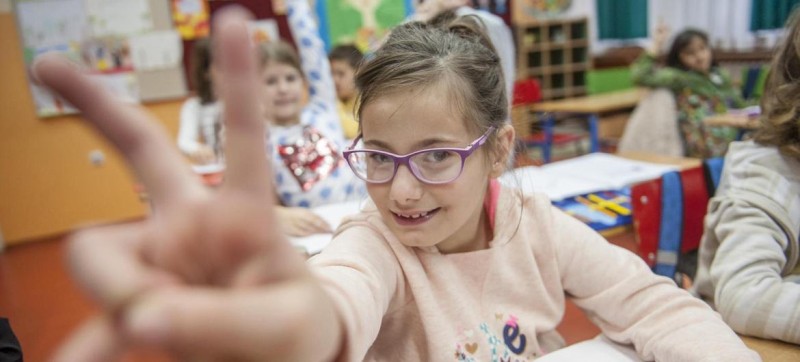Play video
UNICEF/UNI233801/Pancic Persons with disabilities experience exclusion in every aspect of their lives. Stigma and discrimination manifest in many forms, including stereotyping, low expectations, harassment, isolation, abandonment and violence.
“Many persons with disabilities die earlier, some up to 20 years earlier, and more are at risk – double the risk – of developing a range of health conditions compared to the general population,” said Darryl Barrett, WHO’s Technical Lead for Sensory Functions, Disability and Rehabilitation, briefing reporters in Geneva.
Tweet URL
The Global report on health equity, published just ahead of the International Day for Persons with Disabilities, demonstrates that while some progress has been made in recent years, systemic and persistent health inequities continue, and many persons with disabilities face an increased risk of developing chronic conditions and higher risks.
“It’s a significant reason for these early deaths because of poor quality health services”, noted Mr. Barrett. “There’s also a higher incidence of diseases such as tuberculosis, diabetes, stroke, sexually transmitted infections, and cardiovascular problems among persons with disabilities.”
Poor health services
“Health systems should be alleviating the challenges that people with disabilities face, not adding to them,” said WHO Director-General, Tedros Adhanom Ghebreyesus. “This report shines a light on the inequities that people with disabilities face in trying to access the care they need.
“WHO is committed to supporting countries with the guidance and tools they need to ensure all people with disabilities have access to quality health services.”
Many of the differences in health outcomes cannot be explained by the underlying health condition or impairment, said WHO, but by avoidable and unjust factors such as inaccessible public health interventions, or too little consideration given to persons with disabilities during health emergencies planning.
1.3 billion with ‘significant disability’
“This report also has new global prevalence estimates for significant disability, and that is at about 16 per cent of the population, or at today’s rate, 1.3 billion persons with significant disability“, noted Mr. Barrett. “So that equates to about one in six of us.”
With an estimated 80 per cent of persons with disabilities living in low and middle-income countries where health services are limited, addressing health inequities could be challenging. Yet even with limited resources, much can be achieved, said WHO.
Take action
The report recommends 40 actions for governments to take, from addressing physical infrastructure to training of health workers.
“The attitude and competency of health workers, for example, can be quite negative and have an impact on the health outcomes of persons with disabilities”, said Mr. Barrett.
WHO stresses the need for urgent action to address the inequities: “When governments are looking at training their health workforce, it’s important that they include disability as part of that training and education so that the workforce is confident and competent to be able to deal with what it needs to deal with”, emphasized Mr. Barrett.
The report shows that investing in a disability-inclusive health sector is cost-effective. WHO calculates that governments could expect a return of about $10 for every dollar invested on disability-inclusive noncommunicable disease prevention and care.




Comments are closed.